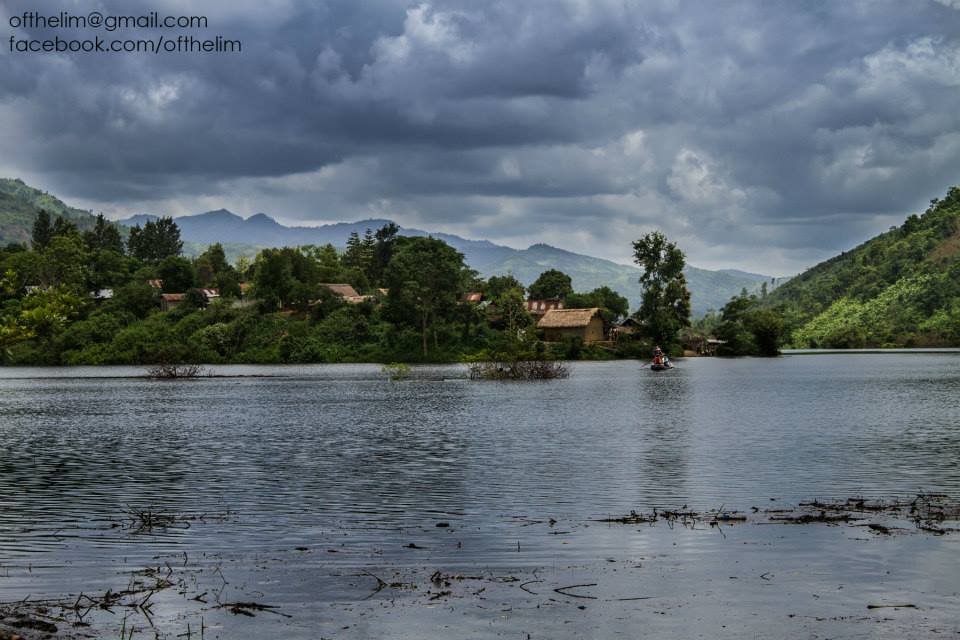
IMPHAL July 5: The Sunday congregation at Chadong Baptist Church today sang mournfully and soulful today, perhaps for the last time as water level continues to rise and flood their homes, and perhaps by next week the church too would be underwater.
The fasting prayer list includes praying for strength and ability to adapt and rebuild when they are forced to migrate to a new site home.
Some have already moved to the nearest towns while the remaining await their fate in dread.
Lamlai Khunou villagers had built two bridges this week following the submergence of the bridge in the approach road to their village. Without these two bridges, Lamlai Khunou village and Chadong village would have been completely cut off from the rest of the world.
It takes approximately 50 minutes to walk to the bank of Chadong village from there and wait for one`™s turn in the only boat manned by amateurs. It takes another 10 minutes to row through the vast stretch of water and reach Chadong village.
Till date no government representative had come to assess the pitiful situation and assist our rehabilitation. Instead the Chief Minister has wrongly informed the Assembly during the ongoing session regarding our plight, said a member of the Mapithel Dam Affected Villagers Organisation (MDAVO).
As we row to Chadong village, the visible houses appear like the floating huts in Loktak.
Inside the village, people are seen loading their food grains and household goods and shifting to the higher grounds of the mountain. By the water edge, children were playing with new flocks of grasshoppers.
They talked about the rats in their dwellings at night and the fear of other reptiles. The school campus has become a militarized zone after the Manipur Rifles and Manipur Police shifted to the two school buildings since July 1.
Barracks have transformed the new Junior High school into a fearful sight. One of the classrooms has been converted into a kitchen otherwise it may have been the midday meal kitchen.
They said their erstwhile shelter in the vicinity was dismantled and shifted by the house owners so they moved in to the new school buildings. The government has not provided any water transport for men in uniform to transport their ration so they share the only boat of the villagers, which was donated by Centre for Social Development for the affected people.
A reliable source informed that two boats from Fishery and Loktak Development Authority were approved by the government. But even after a month of submerging the only connecting bridge, the arrival of the boats seem to be still tangled in bureaucratic procedures.
While documentary film makers and media persons continue to document the anxiety and anger of the affected people, hordes of people irrespective of community flooded the banks and littered the environment. They came by car, bike, auto rickshaw and even by hiring bus.
Most of them said they are exploring the new landscape. It thus spells a huge tourist potential which needs to be managed in a better way.
As for Riha Village, the government has not specified anything on community water rights after the construction of the dam nor have they survey the river banks or settle community owned grazing grounds and private farms/standing property.
We are losing all our traditional ownership rights over our river and resources, lamented Tuithung Lunghar, a villager of Riha.
He said, “™We are the people whose livelihood is dependent on the seasonal products of the forest and the river resources. Yet these rights are not settled till date`™`™.
Another affected villager adds, “™We feel so helpless as citizens in pursuing through the right course. As the government is trampling over even a stay order of the court, what else is left for us to pursue? We have collectively knocked on every possible door of the concerned departments and authorities`™`™.
The government has merely compensated for the paddy fields and completely ignored the repeated petitions on river based livelihood including our fishing rights. Soon they will expect us to pay for this water that belongs to us, he ridiculed.
The villagers have various relationships with the river besides the livelihood angle. Christian rituals like Water Baptism are held in the river and fasting prayers are hosted on the banks. Recreation and social activities like annual picnic cum fishing of peer groups and village bodies are held on the river beds. Such traditions of fishing and feasting will be history now, narrates a women community leader woefully.
Tangkhul Shanao Long and Tangkhul Katamnao Saklong also visited the surrounding villages today to take stock of the situation.


